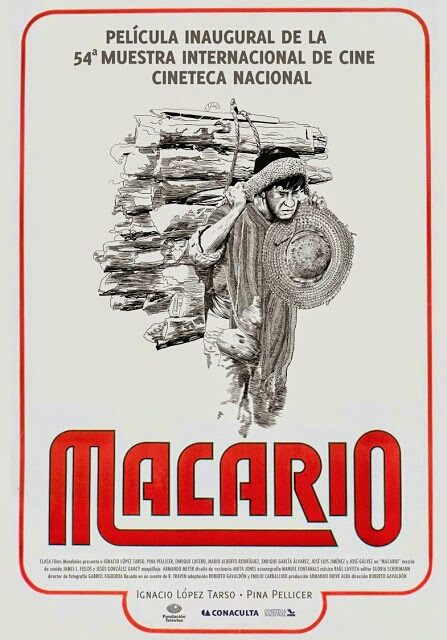
For many Mexican generations preceding mine, Macario is a well-known film from the so-called Golden age of Mexican cinema. For me, it was for a long time just another old film of the kind that my grandparents would watch. Then as I started getting deeper into cinema per-se, I knew this was a basic title I should watch, and now I admit I'm slightly ashamed to have seen it after so long in my life. Before saying anything else, I must reaffirm Macario is one of the true gems of Mexican cinema, a masterpiece that should be an essential for any self-declared cinephile, independently of their nationality.
I've often seen Macario being described as a "supernatural" film and for some reason this puts me off badly. Others, I've seen it described as a "macabre fairy tale". What you should know is that the film deals with the two basic elements of life/death and poverty/wealth in a style reminiscing of Ingmar Bergman's The Seventh Seal, with several cultural and social undertones and criticism. I only later found out it is actually based on a German folk tale (literally described as a fairy tale) called Godfather Death, which was adapted by a mysterious author known as Ben Traven, of German origin, to a Mexican colonial era context.

I'll just give away the basic premise, which I think is enough to entice one to see it.
Macario is a Mexican peasant in colonial Mexico (think of between 1600 and 1800) with several kids and a wife, who despite working hard in the mountains carrying logs, can barely afford to feed his family and himself. Looking at the wealthy, and specifically when he sees some roast turkeys being made, he makes a vow to have a whole turkey for himself or starve to death. In a sequence of heart-touching scenes, his wife steals a turkey and selflessly gives it to him; he runs away and as he prepares to eat it, he meets first the Devil, then God and finally Death (in the form of a peasant), who ask for him to share the turkey with them.
 |
| Ignacio López Tarso, currently 96, and Pina Pellicer, who despite achieving stardom, committed suicide at 30. |
Macario decides to share the turkey with Death and not the Devil or God, by the following reasoning: first, the Devil just wanted to trick him, why would he trade the turkey for gold or shiny things (they would chop off his hands for thinking he's a thief anyway) if the didn't even share it with his family? Then, while regretting not sharing with God, he reasons God is the owner of absolutely everything, so why would he need anything from Macario? But finally, with Death he says, "when you showed up, I thought I wouldn't even get a chance to eat... when you show up there is no time for anything else... I figured if I gave some to you at least I'd get a chance to eat too". This is just marvellous and beautifully executed by Ignacio López Tarso, who plays Macario. Everything unfolds after this when Death offers to reward Macario and elements such as greed, inequality, religion, racism, classism, and then again death, become evident.

On the penultimate scene, Macario is found at Death's cavern (shot at the beautiful Grutas de Cacahuamilpa), which is filled up with candles representing people's life (the wax and length of the candle standing for the lifespan of the given person). When Macario spots his candle and realises how short it is, he begs Death to save it, and seeing his refusal, he decides to take it and run away with it. The final scene then goes back to the day Macario first talked to Death.

Overall, this is a fantastic and beautiful piece of cinema capturing diverse cultural, social and life elements, some of which are inherently timeless inescapable aspects of life, others which still permeate society today, and a few which make Mexican culture absolutely unique.
No comments:
Post a Comment